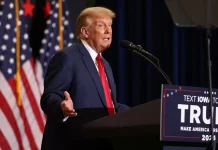BROWNSVILLE — On Monday, Texas Governor Greg Abbott, a Republican, signed a law that grants broad powers to state and local law enforcement to arrest and deport migrants who enter the U.S. illegally. The law, which challenges the federal government’s role in immigration enforcement, has been criticized as the most extreme state-level attempt to crack down on undocumented immigration since Arizona’s controversial “Show Me Your Papers” law in 2010, which was largely invalidated by the Supreme Court.
The law, which will take effect in March 2023, authorizes any Texas law enforcement officer to detain anyone suspected of being an undocumented migrant. The detainees will then face a choice: either comply with a Texas judge’s order to leave the U.S. or face prosecution for misdemeanor illegal entry. If they fail to leave, they could be arrested again and charged with felony illegal entry.
Abbott, who enacted the law in front of a border fence in Brownsville, claimed that the law would deter illegal crossings by more than half, or even up to 75%. He did not provide any evidence to support his claim.
He said that the law would have “extreme consequences” for those who are smuggled by cartels, and that they would “not want to be coming into the state of Texas.”
The law adds to the tension over immigration policy between the Biden administration and the Republican-controlled Congress, which are at an impasse over border security and other national security issues. Texas Republicans have accused the federal government of failing to secure the 1,950-mile (3,149-kilometer) southern border, and have taken matters into their own hands. Since August 2022, Texas has transported more than 65,000 migrants to other cities across the U.S., and has recently installed razor wire along the Rio Grande, which has injured some asylum-seekers.
On Monday, the U.S. government also closed two railroad border crossings in Texas, citing an increase in migrants traveling on freight trains, especially in the past week. The closures, which affect Eagle Pass and El Paso, were criticized by rail operators as a disruption to trade ahead of the holiday season. Troy Miller, the acting commissioner of U.S. Customs and Border Protection, said that the border authorities are facing “unprecedented” numbers of arrivals, exceeding 10,000 crossings on some days this month.
The law, known as Senate Bill 4, has already faced legal opposition from civil rights groups and Democratic lawmakers. The American Civil Liberties Union of Texas announced that it would sue to stop the law, and more than 20 congressional Democrats sent a letter to the U.S. Justice Department, urging it to do the same.
They wrote that “SB 4 is dangerous for the people of Texas and interferes with the federal government’s exclusive authority over immigration and foreign affairs.”
The law has also drawn criticism from Mexico, which is obligated by bilateral and international agreements to accept deportations of its own citizens, but not those of other countries. Under the Texas law, migrants who are ordered to leave would be sent to ports of entry along the border with Mexico, regardless of their nationality. In September and October, Venezuelans were the largest group of migrants arrested for illegally crossing the U.S. border.
Supporters and Critics of the Law Clash in Texas Legislature
The law faced heated debate in the Texas House in November, where Republican state Rep. David Spiller defended the law against concerns that it would be used to arrest immigrants across the state. He said the law would mainly target border counties, where most illegal crossings occur. He also rejected several attempts by Democrats to limit the scope of the law, such as an exemption for campus police.
Spiller argued that the law would not affect immigrants who have been living in the U.S. for a long time, because the illegal entry charge is a misdemeanor, which has a two-year statute of limitation.
He said during the debate, “This is not, ‘Round up everyone who is here illegally and ship them back to Mexico.’”
Critics of the law have accused Texas Republicans of using the law as a way to pressure the Supreme Court’s new conservative majority to revisit its 2012 ruling on Arizona’s law. In that decision, Justice Anthony Kennedy said that Arizona may have “understandable frustrations” with immigrants who are in the country illegally, but that it cannot pursue policies that “undermine federal law.”





